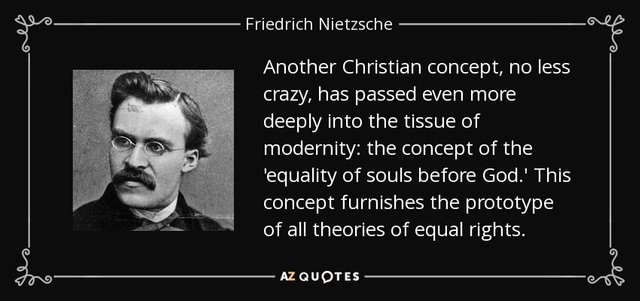Freemasonry Demystified - Full Documentary; Containing Unprecedented Information on Freemasonry's Soul Mysticism and Gnostic Goals
FREEMASONRY DEMYSTIFIED:
Its organizational structure and rule being the Benedictine monastic precepts; its ecumenical spiritual character having been inherited from the essence of the Christian religion which is to say neoplatonism; its primary secret owing origin to Meister Eckhart and its worldly action being informed by the prophecy of Joachim of Fiore in accordance with the Jesuit Order at the helm of said prophecy
This documentary uniquely traces the lineage of Freemasonic doctrine to Christian Neoplatonic mysticism/monasticism and specifically to the monk Mesiter Eckhart. It also contains original exposition on the Freemasons' gnostic goals with regard to the Third Age prophecy of Joachim of Fiore and the Jesuit Order. This is a novel, groundbreaking history and analysis of Freemasony, the enlightenment and new world religion, which is not a new religion at all, but is one stemming from ancient times within the monasteries. It is also shown in the first part of the video how the offices and rules of the masonic lodges are based on the Benedictine precepts for structuring monastic life and community.
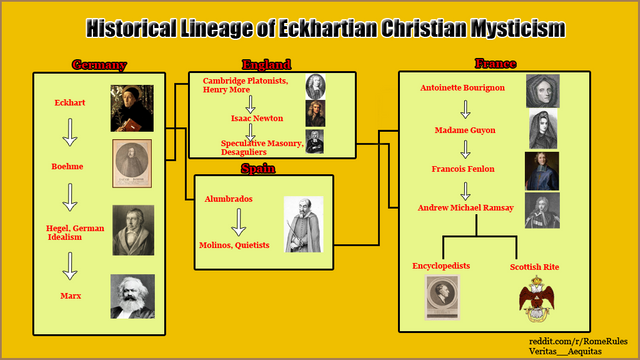
The start of the speculative freemasonic tradition as well as the quietistic tradition can be found in the neoplatonism of Mesiter Eckhart, a 13th century Dominican Monk in alignment with the above chart.
Eckhart taught that knowing is the basic attribute of the divine. Under this metaphysical assumption, mystic contemplative states are promoted and desired. Intriguingly, the enlightenment, which contributed greatly to the founding of secular nation states borrowed this Eckhartian Neoplatonic mentality.
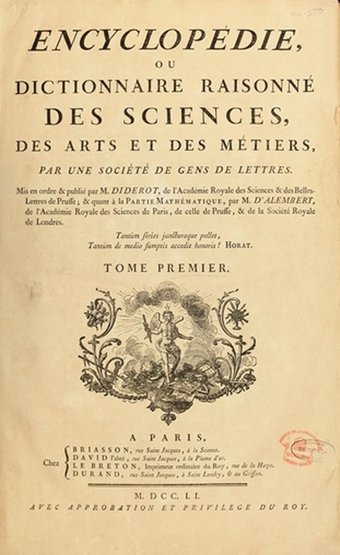
Eric Voegelin, who was one of the most eminent conservative politcal philosophers of the 20th century, in his "Structures of Consciousness" lecture spoke to how the entirety of Diderot's Encyclopaedia, which is considered the most important work in the spread of the enlightenment, was conceived out of Neoplatonic states of consciousness:
"Then, a special development out of Platonic philosophy: under the impression of apocalyptic and gnostic movements in the Hellenistic and Roman empires, [there] extends the specific development of the Neoplatonic systems. "Neoplatonic systems" and their language are a further language we have to deal with into modernity; because the Neoplatonic systems have especially been revived (after having a somewhat subdued existence during the Middle Ages) at the end of the 15th century in Florentine Platonicism--[where] we have a strong Neoplatonic state of mind ([or] consciousness) and of Neoplatonic language for the expression of problems of reality--of which, for instance, Frances Yates of the Warburg Institute, in her "Giordano Bruno" volume, has given at least the earlier part. But this Neoplatonic tradition goes on. And you find it is usually disregarded or at least not too well known: for instance, [in] the Encyclopedie francaise there is an article organized by Diderot on eclectisme --not eclecticism--in which he explains that the conception of the Encyclopedie, and the whole state of consciousness inspiring the Encyclopedie, is derived from the Neoplatonic systems. And once you realize that the Encyclopedie is a language symbol belonging to Neoplatonism in its modern form [...], you will also understand certain points in the Hegelian Encyclopaedie better, because he is also strongly influenced by the Neoplatonists, especially by Proclus, and wants a similar kind of system corresponding in its consciousness-structure to certain elements especially in Neoplatonic language."
This neoplatonic state of conciousness is the Eckhartian quietisitc contemplative state by which one's soul is "grounded" and through which one "lets go" of active thinking.
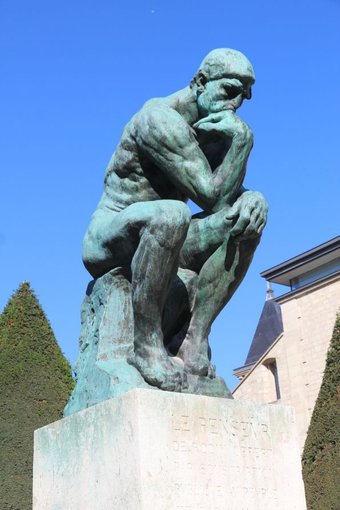
As further attestation of this, in Let There Be Enlightenment: The Religious and Mystical Sources of Rationality published in 2018 on John Hopkins University Press, its authors Matytsin and Edelstein describe Diderot's espousal of Quietism and disattachment on pages 258-260:
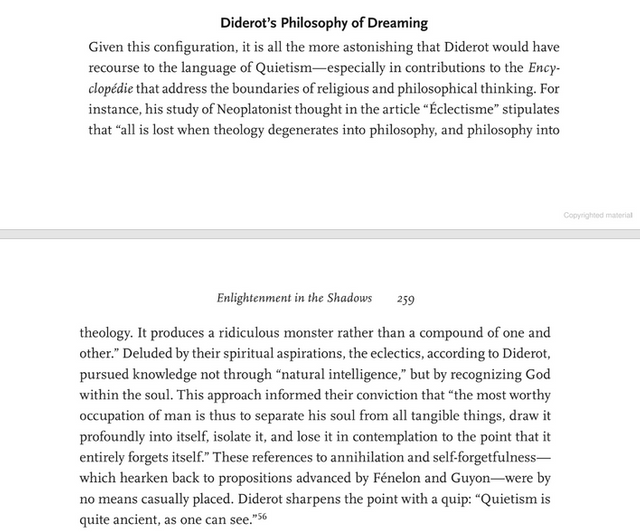
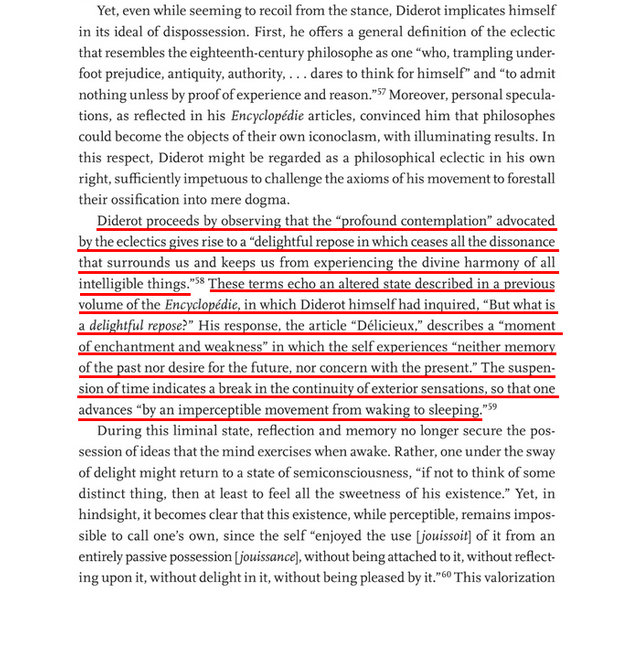
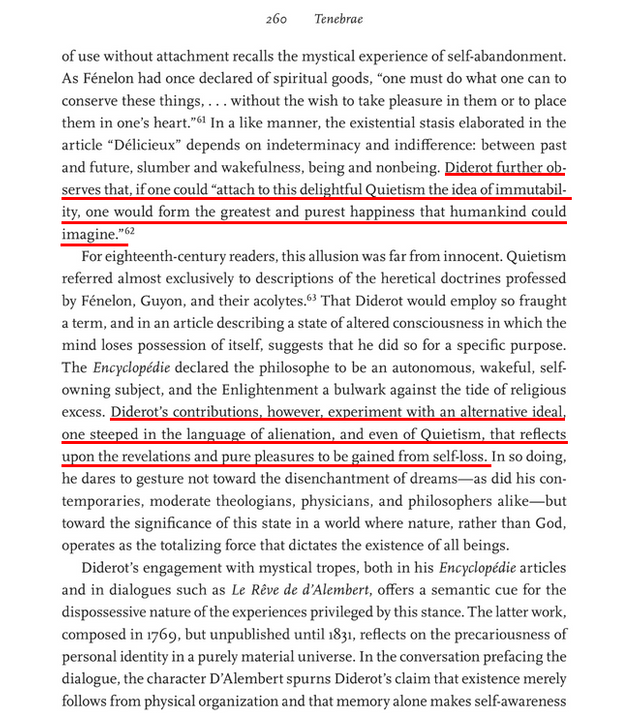
What is vital to understand is because the soul or knowing is regarded more or less as God, it leads to radical notions of equality. "Everyone has a soul and is capable of thinking, therefore we are all equal with God and all equal in general." The communist movements of the twentieth century did in fact arise out of libertarian foundations on par with the enlightenment as can be read from Isaac Deutscher. Stalin; A Political Biography. New York: Oxford Univ. Press, 1967, p. 217-218 as well as Robin Hahnel, Economic Justice and Democracy. Routledge Press. p. 138.
